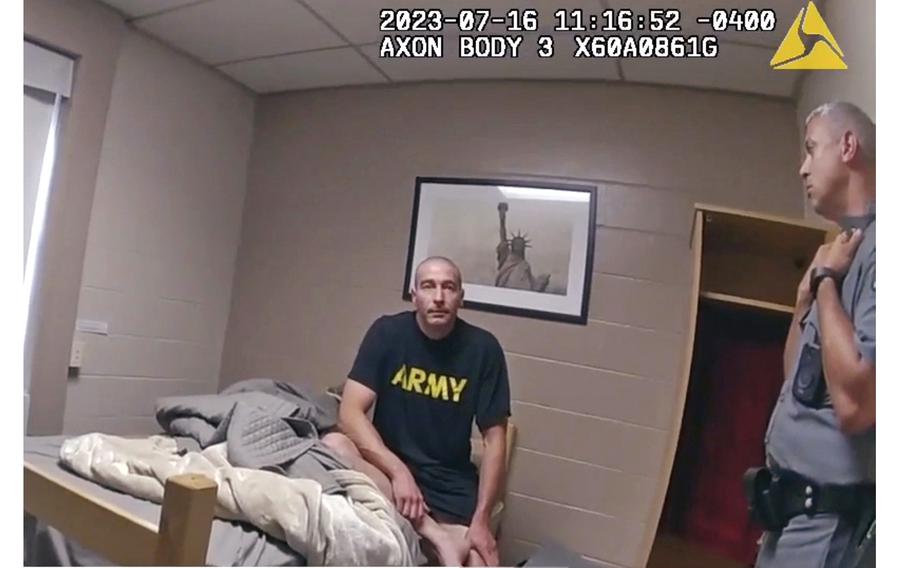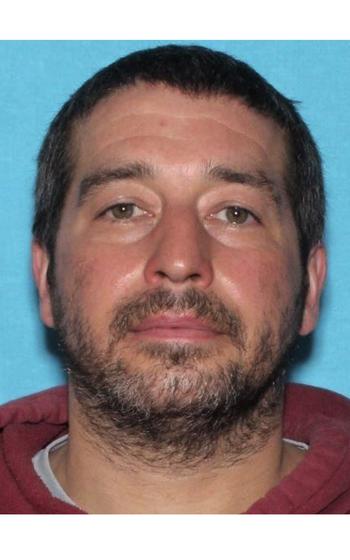Army reservist Robert Card points a gun while entering Sparetime Recreation in Lewiston, Maine, on Oct. 25, 2023, in this image taken from video. (Androscoggin County, Maine, Sheriff’s Office)
The Army punished three officers for mishandling Sgt. 1st Class Robert Card’s mental health case in the months before he killed 18 people in Maine, yet a service investigation found the military could have done little to stop his shooting spree.
The Army Reserve Command investigation published Tuesday found multiple failures and miscommunications in Card’s chain of command in the months before the reservist committed the mass killing on Oct. 25, 2023. While the 115-page report largely cleared the Army of blame for events that led to Card’s attack on a bar and bowling alley in the town of Lewiston and his suicide, it recommended the Army Reserve review and update its mental health policies.
Lt. Gen. Jody Daniels, who leads Army Reserve Command at Fort Liberty, N.C., said Monday that the service could not compel Card to seek mental health treatment or remove his weapons while he was not on official military orders. She said other agencies, such as local law enforcement, might have been able to do more to stop Card, but the Army Reserve could not.
“We’re doing the best that we can in terms of understanding what did transpire and then make changes for the future,” Daniels told reporters at the Pentagon after accepting the findings of the report. “Whether it could have been avoided is anyone’s hindsight at this point.”
A separate investigation by an independent commission in Maine found in March that Card was in the middle of a psychotic episode in the weeks leading up to the shootings, and local police had probable cause to begin a “yellow flag” process and should have sought a judge’s permission under state law to confiscate Card’s personal firearms temporarily.

In this image taken from New York State Police body camera video, Army reservist Robert Card is interviewed by officers at Camp Smith in Cortlandt, N.Y., on July 16, 2023. (WMTW-TV 8, New York State police)
Card, 40, had enlisted in the Army Reserve in 2001 and served as a petroleum supply specialist and driver with the Maine-based 2nd Brigade, 104th Training Division of the 108th Training Command, according to the service. He never deployed and typically spent the Reserve minimum 38 days per year on duty. The investigation found Card had served “an unremarkable military career” without any combat-related experience. Card did serve short stints on duty as a weapons instructor at the U.S. Military Academy at West Point, N.Y., Army investigators found.
The report said Card had not faced Army discipline in his career before 2023.
Three officers in Card’s unit received administrative punishment outside the military justice system for “dereliction of duty” for failures unrelated to Card and for their handling of his hospitalization, Daniels said.
Those officers correctly alerted local law enforcement about Card’s mental state and access to firearms, she said. But they misunderstood their own authorities, failed to communicate properly with civilian mental health authorities caring for Card and improperly ordered him to duty at West Point last year after he failed to attend earlier training.
Those officers had failed to attend mandatory pre-command training that would have likely helped them better understand their responsibilities and powers while dealing with Card’s distress, Daniels said. They should have known to ask more questions about Card’s condition, and they should have initiated an investigation while he was in the hospital or shortly after he was discharged, in part, to determine “if his condition was aggravated by his” military service or if he needed or “was entitled to follow-up medical care at the government’s expense,” the investigation found.
The officers — whose names and ranks were redacted in the report and who Daniels declined to name Monday — faced punishment that would likely halt them from future promotions, essentially ending their Army careers, the general said. She declined to provide more specific details about the punishment.
Card’s mental health problems appeared to begin about January 2023, the investigation found. The soldier on multiple occasions reported hearing voices to other soldiers in his unit. Some of those soldiers described to investigators public incidents in which Card complained he was hearing people talk about him, including claiming others were calling him “a pedophile.” On several occasions, his Army peers said they observed no one was talking about him.

This photo released by the Lewiston, Maine, Police Department shows Robert Card, who was responsible for the mass shootings in Lewiston, Maine, on Oct. 25, 2023. (Lewiston, Maine, Police Department)
By May, individuals — whose names are redacted in the report — had warned local police about Card’s mental health, citing concern about his “access to weapons … locked in his bedroom and possibly in his vehicle.” At that point, the individuals said they were unaware of any “specific threat” that Card had made to commit violence, leaving the local police without options to disarm him, according to the Army report.
Card’s commanders were aware of his “ongoing behavioral health issues” but still ordered him to annual training at West Point in July 2023, the investigation found. After a verbal altercation with other soldiers there, his unit leaders sent him to the academy’s Keller Army Community Hospital for a mental health evaluation. Providers there found Card’s “condition to be significant enough to order his hospitalization at a civilian mental health facility — Four Winds Hospital in Westchester, N.Y. The hospital found him to be suffering from psychosis, homicidal ideations, paranoia and auditory hallucinations, the investigators said, citing Four Winds discharge paperwork.
Card was restricted from handling Army weapons for 90 days at the time of his hospitalization, investigators said.
The soldier spent 19 days at Four Winds, where he was on Army medical orders while he remained in the hospital receiving treatment. But Four Winds discharged Card from the hospital on Aug. 3 “under questionable circumstances,” releasing him to soldiers in his unit, according to the report. The following week, Four Winds provided Keller Army Community Hospital with information about Card’s diagnosis, but that information was never relayed to Card’s chain of command, according to investigators.
Four Winds declined to participate in the Army’s investigation, Daniels said. The hospital did not respond to a request for comment Monday.
Card never returned to a duty status with the Army after his Aug. 3 hospital discharge, but the Army Reserve Psychological Health Program contacted him on Aug. 11. Investigators said program officials noted Card had stopped taking his prescribed medicine and was displeased that his hospitalization “was limiting his ability to purchase firearms.”
The Psychological Health Program, or PHP, made several additional attempts to contact Card before closing his case at the end of August 2023 “because he was unresponsive to their efforts,” investigators wrote. Daniels said this had been standard practice for the program, but Reserve Command is changing its policy on closing cases.
“Just because someone is nonresponsive doesn’t mean that we don’t need to have additional contact with them,” she said. “If we don’t necessarily reach that individual, that doesn’t mean that the PHP folks shouldn’t be reaching out to that chain of command.”
By September, Card was growing increasingly erratic and threatening violence, investigators found.
“He often described how many people he could hurt with his weapons or what locations he could ‘shoot up,’ ” they wrote.
On Sept. 14, Card “violently assaulted his best friend” — another soldier in his unit — who contacted their chain of command afterward to warn of his concern that Card “would conduct a mass shooting at his unit or somewhere else,” investigators wrote. The chain of command quickly contacted local law enforcement, which failed on two occasions to contact Card.
The Army Reserve Medical Management Center made another attempt to contact Card in October “to follow up with him about his treatment and well-being,” but they were unable to contact him, the investigation found.
On Oct. 25, Card walked into a bowling alley and began shooting before moving to a nearby bar to continue his assault, killing 18 people and wounding 13 more.
Card was found dead of a self-inflicted gunshot wound two days later.
Daniels said while legal authorities limit the Army from taking action when a Reserve soldier is in civilian status, she believed his commanders should have pushed harder to convince him to leave his weapons with them. The commanders, she said, did not properly understand that they could make such a request.
“We can ask, we can request, but we cannot compel that they store [their private weapons] anywhere,” Daniels said. “We can store [their firearms] for them — say, ‘Hey, let me take your weapons and put them here,’ … but there’s nothing we can actually compel them to do unless there’s been a medical determination. And, in this case, there was not because Sgt. Card was released by the [Four Winds] civilian providers … [and] deemed not a risk by the civilian providers.”
Based on a recommendation from investigators, Daniels has ordered increased training throughout the Army Reserve on mental health issues and benefits available to Reserve soldiers, she said. The command is also reviewing standard operating procedures and policies for behavioral health reporting within the service.
“We are committed to working closely with relevant stakeholders to ensure that the [Army Reserve] commanders, leaders and soldiers have the tools and resources to ensure the health and well-being of our force and that we can promptly respond to and assist those in crisis,” Daniels said.